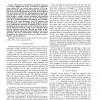Free Online Productivity Tools
i2Speak
i2Symbol
i2OCR
iTex2Img
iWeb2Print
iWeb2Shot
i2Type
iPdf2Split
iPdf2Merge
i2Bopomofo
i2Arabic
i2Style
i2Image
i2PDF
iLatex2Rtf
Sci2ools
110
click to vote
ICC
2009
IEEE
2009
IEEE
Reliability and Efficiency Analysis of Distributed Source Coding in Wireless Sensor Networks
We propose a comprehensive theoretical framework to evaluate reliability and energy consumption of distributed source coding (DSC) in wireless sensor networks (WSNs) applications. Energy efficiency and the amount of measurements that can be successfully decoded in tree-based WSNs employing DSC in the presence of different coding topologies and packet aggregation schemes (PA) are accurately characterized. The system model includes a realistic network architecture with multi-hop communication, automatic repeat request protocol (ARQ), packet losses due to channel impairments and collisions, and correlation properties of the sensed phenomena. Four DSC topologies and three alternatives of PA are considered. The analysis is carried out by evaluating the expressions of reliability of DSC in terms of probability of measurements that cannot be decoded (loss factor), and the efficiency in terms of average energy consumption of the network. Numerical results show that the best choice of DSC topol...
Related Content
| Added | 18 Feb 2011 |
| Updated | 18 Feb 2011 |
| Type | Journal |
| Year | 2009 |
| Where | ICC |
| Authors | Carlo Fischione, Stefano Tennina, Fortunato Santucci, Fabio Graziosi |
Comments (0)

